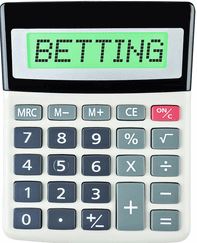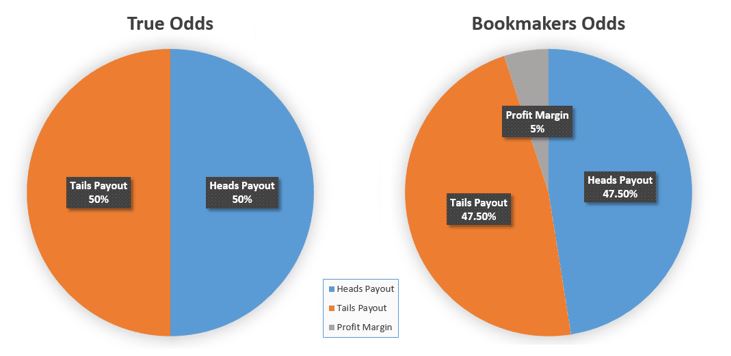
We’ve talked many times before about the importance of always getting the best odds as a sports bettor. Some of your bets will win and others lose, but what successful punters all do is make the bookies pay out as much as possible when they’re on the right side. In this article we’ll be explaining how betting margins work, as well as how the bookies make their money on these margins.
The more the merrier
The easiest way to ensure that you always get the best odds available is to open accounts with as many online bookies as you can. When taking a bet, you shouldn’t choose at random where to put your money, but rather shop around to see which bookie is offering the best odds for that particular market.
For example, If you were shopping for apples, you wouldn’t want to spend R2.50 at Checkers when the apples are only R1.80 each at Pick ‘n Pay and taste exactly the same, would you? The same goes for online sports betting – if bookie x and is going to pay you more than bookie y when you win then it’s a no-brainer who you should give your business, right? You’ll increase your long term profit by hunting for the best betting margins on offer.

How do bookies keep the lights on
Bookies make a profit by accepting bets and then adjusting their odds to attract more action on either side – and in the right proportion – which ideally secures profit regardless of the event’s outcome. This is achieved by offering odds higher than the actual statistical probability of the match result. This deviation or difference represented in the odds is the bookie’s margin, and is their commission or fee for offering you the opportunity to win money.
Although it’s unlikely that a bookie will be able to balance their risk or liability on each side of a specific event perfectly each time, by offering hundreds of markets each day on a wide range of sports, their overall liability evens out and they can take their cut or commission.
How to calculate margin and what it means
To calculate the amount of margin a bookie applies to an event, the odds for all possible outcomes need to be taken into account. The higher the margin, the less punters take home because bookies keep more for themselves, which is why margins are the best way to compare the odds offered by different bookies. When you lose of course, they take everything – win-win!
For instance, if we look at a two-way market like the coin-toss in a cricket match, which is a common bet offered by most bookies. A bookie will never offer you odds of 2.0, which is the true representation of a 50% chance – which the law of probability tell us to be true – that either Team A or Team B wins the coin-toss.

Instead, bookies offer you odds of 1.90 (9/10) or even 1.85 (17/20) on a two-way market. What this means is that if they take the same number of bets (amount of money) that Team A will win the coin-toss as they do on Team B, then they will make a profit regardless of the result. The Betting Margins are always in the bookies favour.
To work this out for yourself, simply convert the odds into decimals and then subtract the number after the decimal point from 100. If the bookie is offering odds of 1.9 (9/10) on each side of a market like this one, then you can calculate his margin to be 10%. Similarly, their margin will be 15% if they are offering odds of 1.85 (17/20) on each side.
Don’t be a mug
What’s very important to realize is that if you keep taking bets where the bookie’s margin is high – it can even be as high as 20% – you will be losing out! Think about it this way: If you place 5 winning bets of R100 where the odds were 1.80, you will have made a profit of R400.
This means that for every 5 times you win, you’re giving R100 to the bookmaker because their high margin. That’s a lot to pay them just for the privilege of taking a bet! In the long run, this could add up to thousands of Rands unnecessarily spent because you didn’t take the time to look for the exact same product elsewhere.
However, if the bookmaker has very fair odds of 1.95 on both sides of a two-way market and you make the same bets as above, your profit will be R475 and you would have only given R25 to the bookmaker for the pleasure of using their service.
Bet smarter!
The margin bookies make varies across operators and the amounts also differ depending on the sport and market which you’re betting. Now that you know how odds work, don’t place another bet without first calculating margin to find out how much your bookie is really charging you for their service. If you’d like to know more about betting in South Africa then check out our ultimate betting guide, which covers everything you need to know, including how to get started.

